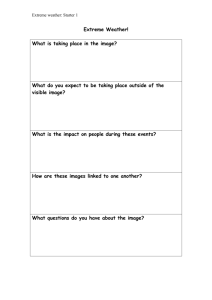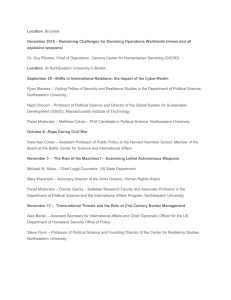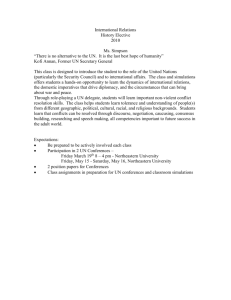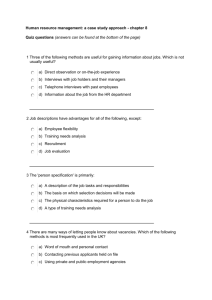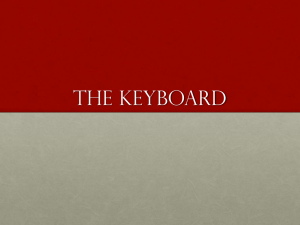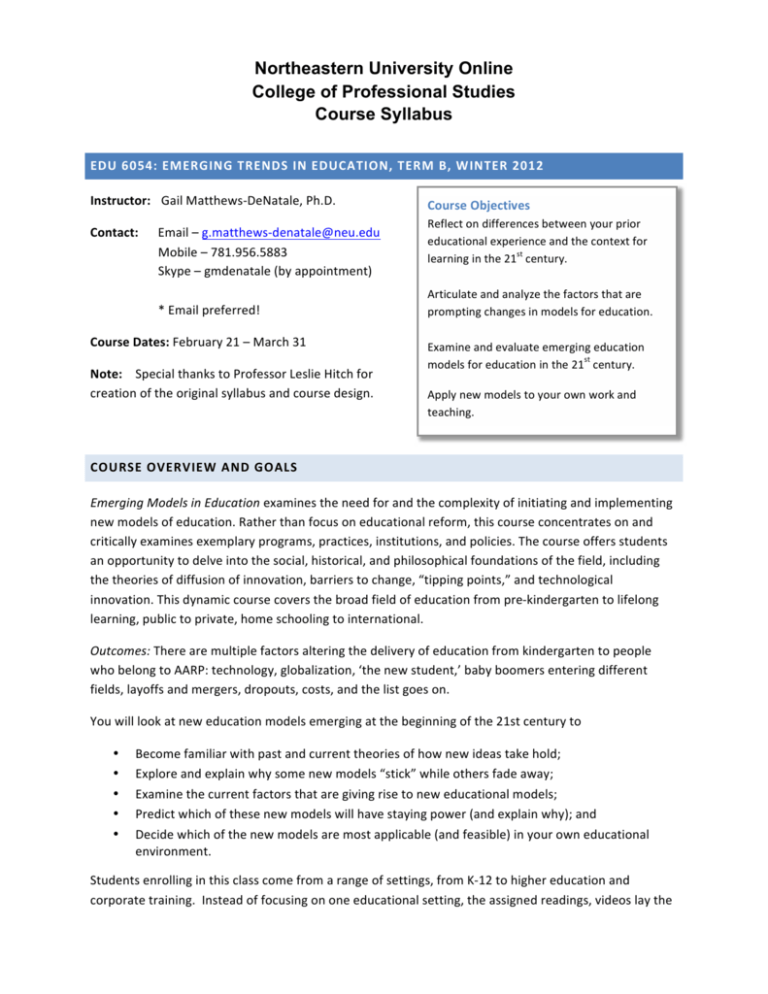
Northeastern University Online
College of Professional Studies
Course Syllabus
EDU 6054: EMERGING TRENDS IN EDUCATION, TERM B, WINTER 2012 Instructor: Gail Matthews-­‐DeNatale, Ph.D. Contact: Email – g.matthews-­‐denatale@neu.edu Mobile – 781.956.5883 Skype – gmdenatale (by appointment) * Email preferred! Course Dates: February 21 – March 31 Note: Special thanks to Professor Leslie Hitch for creation of the original syllabus and course design. Course Objectives Reflect on differences between your prior educational experience and the context for st
learning in the 21 century. Articulate and analyze the f actors that are prompting changes in models for education. Examine and evaluate emerging education st
models for education in the 21 century. Apply new models to your own work and teaching. COURSE OVERVIEW AND GOALS Emerging Models in Education examines the need for and the complexity of initiating and implementing new models of education. Rather than focus on educational reform, this course concentrates on and critically examines exemplary programs, practices, institutions, and policies. The course offers students an opportunity to delve into the social, historical, and philosophical foundations of the field, including the theories of diffusion of innovation, barriers to change, “tipping points,” and technological innovation. This dynamic course covers the broad field of education from pre-­‐kindergarten to lifelong learning, public to private, home schooling to international. Outcomes: There are multiple factors altering the delivery of education from kindergarten to people who belong to AARP: technology, globalization, ‘the new student,’ baby boomers entering different fields, layoffs and mergers, dropouts, costs, and the list goes on. You will look at new education models emerging at the beginning of the 21st century to Become familiar with past and current theories of how new ideas take hold; Explore and explain why some new models “stick” while others fade away; Examine the current factors that are giving rise to new educational models; Predict which of these new models will have staying power (and explain why); and Decide which of the new models are most applicable (and feasible) in your own educational environment. Students enrolling in this class come from a range of settings, from K-­‐12 to higher education and corporate training. Instead of focusing on one educational setting, the assigned readings, videos lay the Northeastern University, College of Professional Studies (CPS), Emerging Trends in Education -­‐ P a g e | 2 groundwork for exploration of emerging educational models. Because each of you has a different perspective, you will research and explore models that are most relevant to your field, and then share your findings with the rest of the class. Together we will create a rich repository of resources that represent the cutting edge of educational innovation. The course is organized into six sessions, with one week for each session: Session I
Beginnings Session II
Challenges and Opportunities, Motivation and Change Session III Technology Changes Everything – or Does It? Session IV Emerging Models – Hope or Hype? Session V
Other Radicals Session VI Leading for Change Please note that this is an accelerated, intensive course. The workload for each week far exceeds that which you would be assigned in a full term course because we will be completing an entire quarter’s worth of work in six weeks. This will not be easy, but if you give it your all, it will be very rewarding! REQUIRED BOOKS The following books are required for this course, so you will need to purchase print copies or download the Kindle edition. In addition, each week I will assign optional and required articles, videos, and podcasts – all of which will be provided within the session modules The Tipping Point by Malcolm Gladwell Back Bay Books (January 7, 2002) # ISBN-­‐10: 0316346624 Outliers by Malcolm Gladwell Little, Brown and Company; 1 edition (November 18, 2008) # ISBN-­‐10: 0316017922 The Innovative University by Clayton Christensen Jossey-­‐Bass; 1 edition (July 26, 2011) # ISBN-­‐10: 1118063481 NOTE: You can order textbooks from Northeastern University Bookstore by phone at (617) 373-­‐3182 or (617) 373-­‐2286, online at http://northeastern.bkstore.com, or purchase in person at the main campus bookstore. All texts are also available in e-­‐book format, through your preferred online book vendor. Northeastern University, College of Professional Studies (CPS), Emerging Trends in Education -­‐ P a g e | 3 HOW THE COURSE IS STRUCTURED Sessions: The course is divided into six “Sessions,” one for each week of the course. You can access each session by clicking on the “Sessions” link in left-­‐hand menu of the course web page. Each Monday you will begin a new session. The sessions are presented in modular format, each containing all the information about readings and assignments to be completed for that week, as well as links to the online tools you will use to participate in discussions, contribute to your group wiki, and submit assignments. In the left-­‐hand menu you will also see a section called “Criteria for Excellence” that includes the rubrics by which your work will be assessed and examples of excellent work. In each session, each week you will be expected to contribute to a group wiki and to a written discussion. This contribution is counted as your “participation” in the course, and you will receive a score for participation each week. Since participation is 45% of your grade, you should give these assignments your full and thoughtful attention! Written Discussions: Discussions are a place for you to process readings, voice ideas, and grapple with topic-­‐related issues. Discussion links and deadlines are provided within the session modules, along with writing prompts designed to guide your contributions. Remember to ground your contributions in evidence, citing from course readings and relating course concepts to your own educational experience. The goal is to have a substantive dialogue with your peers about session concepts, questions, and concerns. TIP #1 In large classes such as this one, the volume of text in a discussion board can become overwhelming. Use the “Collect” f eature in the discussion forum to gather all posts into one document, and then skim through, looking for themes, ideas, and comments that draw your attention. You may even want to save the collection of posts for offline and/or print reading. This method helps you quickly identify messages to comment on. TIP #2 Some people prefer to follow the development of a discussion in “real time” using their smart phones, because it enhances their sense of community. To do this, click on the “subscribe” option in the discussion and all posts will be forwarded to your email account as soon as they are posted. Be forewarned that this option can generate LOTS of email! But I do recommend subscribing to the Water Cooler. Written discussions begin with a “starter message,” that you post before 11:59 p.m. EST Thursday, after which you will read your colleagues’ messages and post several “follow-­‐up” messages between Thursday and 11:59 p.m. EST on Sunday. The discussion takes place during a three-­‐day window of time. You can post at any time during this window, and you should check the discussion several times between Thursday and Sunday to see how it develops and chime in with your thoughts. Northeastern University, College of Professional Studies (CPS), Emerging Trends in Education -­‐ P a g e | 4 During the first week of the course you will compose the “starter message” on your own. In Session Two through Session Six you will work with your wiki group to compose and post a starter message and then write the follow-­‐up messages on your own. To see a rubric for how discussion messages will be graded, look in the “Criteria for Excellence” section of the course. All group members receive the same credit for weekly work, so it is in your best interest to give it your all! TERMINOLOGY Starter Message: A post that is submitted at the beginning of the week’s discussion (before 11:59 EST each Thursday). Starter messages are designed to pool information and reactions to the week’s readings/viewings. Reading Response Critique: Reading critique is the f ormat f or starter messages. Critiques should be more than just a report on weekly readings/viewings. They should reflect the ideas and opinions about the pieces, and raise questions to stimulate further discussion. Group Wikis: Your preliminary course participation Follow-­‐up Messages: Individual posts that you each week will take place in a group wiki. If you’ve write in response to the starter m essages. In never used a wiki, don’t fret – the session materials these messages you discuss, debate, add ideas, and develop deeper understanding. include tutorials to get you up and running! In Session Two you will be placed in one of five wiki groups: Disruptive Innovators, Connectors, Outliers, Mavens, and Salespeople. The names of these wiki groups are taken from your first readings – Gladwell’s The Tipping Point and Outliers. This course requires a great deal of reading. Since many hands make light work, I have developed the wiki system to divvy up the work and pool our knowledge so that we can create a learning experience that is greater than the sum of its parts. This is sometimes referred to as “crowdsourcing.” Each week your wiki group will be assigned a set of readings and videos, and you will use your wiki to pool reading/video notes. Using a rotating system, each week one member will take a turn serving as the starter message author. The starter message author will use group’s notes to author a reading response critique (starter message) and post it to the whole group discussion before 11:59 p.m. EST Thursday. In this way the whole class will be exposed to ideas from dozens of articles each week! To see a rubric on my expectations for the “Reading Response Critique” substance and format, look in the “Criteria for Excellence” section of the course. All group members will receive the same credit for the reading response critique starter messages. Note that some required course readings and videos, particularly readings those from The Innovative University, will be assigned to everyone in the class. You will be expected to draw on the whole-­‐class readings as you write your individual follow-­‐up messages between Thursday and Sunday. After the starter messages have been posted, you will read the other three wiki reading summary critiques. You will use the general readings and the group-­‐based reading summary critiques to inform the whole class discussion that takes place between Thursday and Sunday – remember to cite the summaries in your response. Northeastern University, College of Professional Studies (CPS), Emerging Trends in Education -­‐ P a g e | 5 AN IMPORTANT NOTE ON TIME AND INVOLVMENT IN AN ONLINE COURSE It may be tempting to think that an online course will be less time-­‐consuming than a face-­‐to-­‐face class. Please don’t make that mistake. In fact, the two types of courses require the same amount of time, except that in an online course much of your work will be done independently – writing and reading posts, viewing materials, etc. In this online course, you will take an active role that requires discipline and time management. Remember that accelerated courses accomplish the same amount of learning that takes place in a 10-­‐week quarter in only 6 weeks. This means you should allot yourself approximately 20 hours a week to participate in the class!! Importantly, this will be active learning, so it may “feel” like you are spending even more time than when you take a face-­‐to-­‐face course. (It may be easy to fall asleep in class, but much harder to do so when writing on-­‐line!) However, precisely because you will be actively involved, you have the opportunity to learn an incredible amount in a relatively short time. There is a rhythm and pattern to the work. Arrange your schedule according to the regular deadlines outlined in the chart below, setting aside several regular blocks of time each week to “be in class.” Monday Tuesday Wednesday Thursday Friday Saturday Sunday New session
becomes
available,
read the plan
Read, do
assignments,
watch videos
Read, do
assignments,
watch videos
Read, do
assignments,
watch videos
Contribute to
group wiki Contribute to
group wiki
Author starter
message
Read and
respond to
classmates’
discussion
posts 11:59 p.m.
EST deadline
for responses
to classmates’
posts
Author
Reading
Response
Critique starter
message 11:59 p.m.
EST deadline
for posting
starter
message
Read and
write follow-up
messages in
response to
classmates’
discussion
posts
Read, do
assignments,
watch videos
Contribute to
group wiki
Since this is a six-­‐week intensive course you will find that you may need to be online three to four times during the week, particularly during the Thursday-­‐Sunday window for follow-­‐up discussion. Your participation can always be asynchronous, allowing you to work at any time convenient to you. However, you need to contribute in a timely fashion throughout the week so that the group will achieve its goals. Late postings of wiki notes and discussion messages will have a devastating impact on your participation grade! COMMUNICATION WITH THE PROFESSOR Professor Participation in Weekly Session Discussions: The weekly discussions and wikis are intended to create a conversation among students, not a back-­‐and-­‐forth between the professor and students. Therefore I will not respond to each message or wiki. However, I will follow your work closely. Expect Northeastern University, College of Professional Studies (CPS), Emerging Trends in Education -­‐ P a g e | 6 to hear from me on Friday or Saturday, in a message that includes comments and questions for the whole class to consider. “Water Cooler” Discussion Area for General Questions: In addition to topic-­‐specific discussions that are part of in each session’s work, there is a discussion included in the course website entitled “Water Cooler.” Post questions about the course or requests for clarification of material in the readings in this public area, because if you have a question it is likely that others are wondering about it, too. This will make it possible for the whole class to benefit from your query. Announcements: In addition to facilitation posts in the discussions, I’ll also send logistical updates as needed. Depending on the nature of the message and its level of urgency, I will post an announcement, send an email message, or both. Please check your Northeastern email on a regular basis; otherwise you may not see an important message! If you have a follow-­‐up question about an announcement, please post it in the “Water Cooler” discussion so that all can benefit from your query. Office Hours: Flexibility of location is one of the benefits of online learning. It's best to set up one-­‐on-­‐
one meetings by appointment so that we can schedule a time that works for both of us. Drop me a line at g.matthews-­‐denatale@neu.edu. We can talk over the phone, or if you want us to see each other while we talk we can use Skype (username gmdenatale). If you live in the Boson area, we could even arrange to have coffee at a mutually convenient location. ASSIGNMENTS AND GRADING Further details on assignments will be described in the weekly session materials. Briefly, four factors determine your final grade (see chart and explanations below). Grading Distribution Class Participation (e.g., discussion posts, wiki notes) Mid-­‐Course Paper (written commentary) Final Presentation ePortfolio 45% 20% 25% 10% IMPORTANT NOTE: I will not accept late postings, papers and presentations unless there are mitigating circumstances (e.g., significant health events or a death in the family, with documentation). Contact me immediately with a request for an extension – prior to the deadline. I reserve the right to deny extension requests that are not substantive and documented. You should also tell your group and/or partners. Session Topic Summary of Readings, Videos, and Assigned Work 1. Beginnings: Who we are, where we come from, and where we are heading Read The Tipping Point Chapters 1 and 2; Outliers Chapters 1 and 3. Post to “Introductions and “Vision for Education” forums, learn and share best practices about Wikis, etc. Northeastern University, College of Professional Studies (CPS), Emerging Trends in Education -­‐ P a g e | 7 2. Challenges and Opportunities, Motivation and Change Read Innovative University Parts One and Two, two chapters in Outliers and Tipping Point (your choice), readings about change theory, and sets of articles/videos posted in group wikis. 3. Technology Changes Everything – or Does It? Read Part Three in The Innovative University, other assigned whole-­‐class readings about technology in education, and sets of articles/videos posted in group wikis. Same system as Session Two for wiki note-­‐taking, reading response starter post, and follow-­‐up discussion. Post notes to your group’s wiki. Wiki group delegate composes and posts a reading response critique starter message to the discussion. Everyone reads/posts follow-­‐up discussion responses. Receive and read guidelines for the written commentary assignment, begin work on paper. Experiment with one emerging technology, report on the experience and the tool’s relevance for education, and consider strategies for evaluating the educational effectiveness of the tool. 4. Emerging Models – Hope or Hype? Read Parts Four and Five in The Innovative University, whole-­‐class readings, and wiki-­‐based reading sets. Same system as above for note-­‐taking, starter message, and follow-­‐up discussion. Use Blackboard’s email tool to send an idea for your Final Presentation to the Professor. Complete Written Commentary and submit between Wednesday and Sunday 11:59pm EST. Begin work on final presentation. 5. Other Radicals View wiki-­‐based sets of videos/websites on “radicals” in the field of education. Same system as above for note-­‐taking, starter message, and follow-­‐up discussion. Work on final presentation. 6. Leading for Change Complete and post final 5-­‐10 minute presentation (deadline is 11:59 EST Wednesday). Comment and provide feedback on at least three presentations. View videos about change. Same system as above for note-­‐taking and starter message. All work in this course should be either original or with proper attribution. As educators we would expect nothing less from our students. Any submission where there is not proper attribution or plagiarism will receive an automatic grade of F. The CPS grading standards in the CPS Student Handbook, at http://www.cps.neu.edu/student-­‐services/student-­‐handbook. Class Participation (45%): You are expected to respond to all threaded discussions and contribute to your group wiki on a weekly basis (and on time). You should do so having completed all readings/viewings and ready to participate actively and constructively in the discussions. Please note that these assignments constitute a major portion of your grade. Remember that your classmates and group mates are counting on your contributions to the wikis and discussions. It is your responsibility to not let them down! A discussion rubric is located in Session One module of the course. At a minimum, messages should exhibit the following qualities: Northeastern University, College of Professional Studies (CPS), Emerging Trends in Education -­‐ P a g e | 8 Value: There's nothing more annoying than clicking on a message link to find that it reads "me too" or "I agree totally." So be sure that your messages add something substantive to the conversation. If you agree or disagree with another person's post, say why. Draw on ideas from assigned materials and your own experience; relate your input to the topic and larger course concepts. Please note that I will look for evidence in your posts that you have viewed and read the weekly materials! Also, if you see a website or news clip that’s relevant, or if the discussion resonates with things you’ve learned in other courses, please tell us about it. Connections: Making connections is an important part of a discussion-­‐based approach to learning. Ask questions and build on the ideas of others to take the conversation to a deeper level. In incorporating readings into your responses, the goal is not to quote chapter and verse (e.g., "on page # the author states that X"), but rather to figure out what the course concepts mean, what you think of them, and how you intend to act upon what you're learning in your lives and work. So follow-­‐up messages might read something like one of the samples below -­‐-­‐ though this is not an exhaustive list o "When I compare X reading with Y in our discussion, I [think, conclude, disagree] ... because ...." o "John, when you say X, that seems different from Y in our reading. What do you make of that?" o "Jane and Joe’s comments that X reminds me of Y. If that's the case, then I think Z." o "The author/teacher says X, but when I look at my experiences at my [school, workplace] Y I'm not buying it. I think Y because Z." Concision: Abraham Lincoln is credited with saying "I'm sorry that this letter is so long. I didn't have time to write a short one." Message composition is part of the learning process, because in editing the message you are also clarifying your thoughts for yourself. Take time to craft your message before you post it, writing a first draft and then editing it down to the most essential components. Your message should have one main thought. Avoid composing directly in the message board because that leads to "stream of conscience" writing. Your starter message may be longer than follow-­‐up messages, because it lays out your thinking (aim for less than 200 words). Follow-­‐up messages will be shorter and should be interactive, questioning and building on things that the group has said (100-­‐150 words). The ideal post contains no more than one screen full of text, and the text is formatted in paragraphs, bullets, headings, etc. to make it easier to read. Timeliness and Follow-­‐Through: The quality of a discussion is directly related to timeliness of posting. When participants post messages before the deadlines, the group has more to work with in the ensuing discussion. Likewise, follow-­‐up messages should be timely and build upon the contributions of others – questioning, looking for connections, reconciling discrepancies, and grappling with ideas. Good discussions involve multiple volleys of communication. Do not wait until the last hour on Sunday to post all of your messages! Written Commentary (20%): At the beginning of Session 3 you will receive guidelines for a written commentary. The assignment will be due between the middle and end of the following week, with of deadline of Sunday 11:59 p.m. EST the week of Session 4. The paper will not be late if received within Northeastern University, College of Professional Studies (CPS), Emerging Trends in Education -­‐ P a g e | 9 this window. Getting the paper to me by Wednesday is preferable because you will have more time to prepare your final presentation. This assignment draws heavily on the readings and videos. It is an academic paper that requires proper citations, good organization of ideas, and an understanding of the concepts and readings up to Session 3. The paper should be no more than six (6) pages, excluding bibliography. Please do not use Wikipedia as a source. A rubric for this assignment is available in the “Criteria for Excellence.” Individual or Team Presentation on an Emerging Model (25%): This is where you can use your imagination, creativity, and “pie in the sky” ideas to develop an Emerging Model that you present to the rest of the class. You may choose to develop a presentation on your own, or partner to create a group presentation. Note that participants all receive the same grade for group presentations. You can draw on model you learn about in the class, those you know about that worked once and faded away, your own ideas, or ideas that are rumbling around your organization. Anything goes! Look in “Criteria for Excellence” for exemplars. Preferably, your presentation will combine text, visuals, and audio. For example, you could use voice-­‐
over PowerPoint, one of the easy-­‐to-­‐use tools available on the web (e.g., VoiceThread, AuthorStream, Jing, YouTube), or the webinar tool Blackboard Wimba. For Wimba, contact your instructor in advance to set up a presentation “room.” Whatever technology you choose to use, PRACTICE BEFOREHAND to test out and master the tool. I will have little sympathy for those of you who wait until the last minute, only to discover that the technology doesn’t work the way you anticipated. Final presentations are due between the beginning and middle of Session 6 (between 11:59 p.m. EST Monday and 11:59 p.m. EST Wednesday), should be no more than 5-­‐10 minutes, and easy to view and/or download the material. A rubric for this assignment is in the “Criteria for Excellence.” From Wednesday through Friday in Session Six you will view the presentations and provide feedback to your classmates. On the last day of the class you will submit a self-­‐assessment to the assignment dropbox, and if you are working in a team you will also assess the contributions of your teammates. Incorporate feedback from the rest of the class in your self-­‐assessment. ePortfolio (10%): In this course, you will use ePortfolios to get to know your peers, store a copy of your final project, and to also consider how your experiences in this course connect with your program of study and life goals. In addition to ePortfolio assignment directions in the session materials for weeks one and six, please read “Master of Education Program ePortfolio Requirement” below and browse the ePortfolio section of the course website. GETTING HELP The best place to go for help depends on the specifics of your concern or question. Please post course-­‐
related questions and concerns to the "Water Cooler" discussion, and check this discussion regularly to stay in the loop on questions and clarifications. Tip: The “subscribe” option forwards messages directly to your email, making it easier to monitor this discussion. Northeastern University, College of Professional Studies (CPS), Emerging Trends in Education -­‐ P a g e | 10 If you have technical questions or concerns about Blackboard, please visit the Northeastern University Online Support Center (http://smartipantz.perceptis.com/neu), where you can access tutorials and get live chat support, or call 855-­‐836-­‐3520. For Digication ePortfolio help, visit the Digication Support Desk at https://support.digication.com or download the Help Guide at https://northeastern.digication.com/home_guest.digi?sid=2632. Logins: The login URL for Blackboard is http://nuonline.neu.edu. The URL for Digication is https://www.northeastern.edu/online/eportfolios (a login link is also included in the course website). ENHANCING THE COURSE I encourage you to keep current on recent developments in education, because you will be better positioned to participate in debates and reflections in the classroom. For example, you might want to follow these publications and groups: The Educause Learning Initiative: http://www.educause.edu/eli The Chronicle of Higher Education, Professor Hacker Blog: http://chronicle.com/blogs/profhacker The Future of Education: http://www.futureofeducation.com TED Talks, Education: http://www.ted.com/talks/tags/education and http://tedxtalks.ted.com/browse/talks-­‐by-­‐topic/education Higher Education Teaching and Learning Portal: http://hetl.org Edutopia: http://www.edutopia.org If you find another resource that you think should be added to this list, post it to the Water Cooler. In addition to the satisfaction that comes with doing a good job, special consideration will be given to students who are generous in sharing resources with the class! ABOUT THE INSTRUCTOR: GAIL MATTHEWS-­‐DENATALE, PH.D. I have a Ph.D. from Indiana University, and I have taught at Indiana University (Bloomington), IUPUI, University of South Carolina, George Mason University, and Simmons College. In September 2010 I joined the Northeastern University Graduate School of Education as a full-­‐time faculty member. I teach “Emerging Trends in Education,” “New Directions in Adult Learning,” and lead an initiative to integrate ePortfolios into the Masters in Education program. With a background in ethnography, at other institutions I have also taught courses on Oral History, and Digital Storytelling. I recently served on the Arts in Education proposal review panel for the National Endowment for the Arts. I've worked for over twenty years in higher education (I guess that gives away my age!). In that time I've held a range of roles: faculty, instructional designer, academic technology administrator, and even academic dean. I also have experience working with educators at primary and secondary schools. In Northeastern University, College of Professional Studies (CPS), Emerging Trends in Education -­‐ P a g e | 11 each of these roles, I've had the privilege of seeing the institution and its challenges from different perspectives. Education is an important and complex venture, so it's understandable that there are so many different perspectives on strategies for improvement. In this class I look forward to exploring those perspectives with you, and to thinking about possibilities for change that are "outside the box" – new models that will make a difference in the lives of our students for years to come. I grew up in eastern Tennessee and Western North Carolina and came “up North” with my husband about fifteen years ago. I love to hike in the mountains. The photo above was taken during a week-­‐long hut-­‐to-­‐hut trek I recently did with my husband and oldest daughter across the White Mountains. It was forty-­‐five miles of rocky trails, but amazing views. I have two daughters, biological sisters from Cambodia, adopted at the same time when Martha was two and Becca was one. They are beauties (I get to say that because I didn’t have anything to do with creating their good looks!). Look at the pictures to see what I mean. MASTER OF EDUCATION PROGRAM EPORTFOLIO REQUIREMENT Purpose: By pursuing a Master's degree, you are in a process of – metaphorically speaking – writing the next chapter in the story of your life. Your courses are one part of that journey. The ePortfolio is designed to help you document your narrative of growth to see how parts relate to the whole. You construct meaning on your journey, considering how the program informs and shapes personal and professional goals. We believe your ePortfolio will help you improve the quality of your learning experience, both during and after your time in the program. WHAT’S AN ePORTFOLIO? Have you ever remembered a citation, quote, link or idea from a previous course, but couldn’t find it? Have you ever wanted to refer back to work you did earlier in your career or course of study, but discovered that you no longer have the file? Do you want to show off what you’ve done to prospective employers or family members? An ePortfolios is designed for this and much more. You upload documents and reflections to a password-­‐protected website – pictures, m ultimedia presentations, papers, and videos. Then you decide who gets to see them. You m ay want to keep some materials to yourself, show works-­‐in-­‐progress to instructors or peers, or showcase your best work to the world. You get to decide. As of January 2012, all Master of Education students will be expected to develop and maintain an ePortfolio throughout their program of study. You are required to select at least one piece of work from each of your courses for inclusion in your ePortfolio. After selecting the work sample, write a companion reflection about your course-­‐related learning, how it connects with your program-­‐based learning, and your progress toward life goals. Northeastern University, College of Professional Studies (CPS), Emerging Trends in Education -­‐ P a g e | 12 Requirements: You are not expected to go back in time and reconstruct your story from previous courses. But, moving forward, at the completion of each course we do want you to attach a sample of your work and write about how the course influenced your development. Some courses may require additional work in your ePortfolio. We hope you will use this valuable platform to reflect on your growth so that after you graduate you can take your narrative with you as you continue to pursue your goals. What’s Unique about ePortfolios: 21st Century learning challenges us to explore new formats and models for learning. In addition to text-­‐based assignments, your work is expanding to include the creation to include images, audio and video. ePortfolios have the capacity to store work in a range of formats, along with notes to yourself about how they might be useful and why you’ve saved them. In addition to serving as a repository, ePortfolios are online spaces you can use to reflect upon your work, receive feedback from faculty and peers, and keep track of progress toward your professional and personal goals. As opposed to coursework that takes place within Blackboard, ePortfolios are course-­‐independent. They make it easier for you to see connections between courses, helping you get the most out of your program of study. As you near completion of your degree, you can use the same tool to create additional ePortfolios that showcase your accomplishments. These ePortfolios can be useful in job seeking and annual reviews. It makes sense to invest time and care in creating your ePortfolio, because it will be available to you long after you have graduated and you can no longer access Blackboard. ACADEMIC HONESTY AND INTEGRITY STATEMENT The University views academic dishonesty as one of the most serious offenses that a student can commit while in college and imposes appropriate punitive sanctions on violators. Here are some examples of academic dishonesty. While this is not an all-­‐inclusive list, we hope this will help you to understand some of the things instructors look for. The following is excerpted from the University’s policy on academic honesty and integrity; the complete policy is available at http://www.cps.neu.edu/about-­‐cps/policies-­‐and-­‐procedures Cheating – intentionally using or attempting to use unauthorized materials, information or study aids in an academic exercise. This may include use of unauthorized aids (notes, texts) or copying from another student’s exam, paper, computer disk, etc. Fabrication – intentional and unauthorized falsification, misrepresentation, or invention of any data, or citation in an academic exercise. Examples may include making up data for a research paper, altering the results of a lab experiment or survey, listing a citation for a source not used, or stating an opinion as a scientifically proven fact. Plagiarism – intentionally representing the words or ideas of another as one’s own in any academic exercise without providing proper documentation by source by way of a footnote, endnote or intertextual note. Unauthorized Collaboration – Students, each claiming sole authorship, submit separate reports, which are substantially similar to one another. While several students may have the same source material, the analysis, interpretation and reporting of the data must be each individual’s. Northeastern University, College of Professional Studies (CPS), Emerging Trends in Education -­‐ P a g e | 13 Participation in Academically Dishonest Activities – Examples include stealing an exam, using a pre-­‐
written paper through mail order or other services, selling, loaning or otherwise distributing materials for the purpose of cheating, plagiarism, or other academically dishonest acts; alternation, theft, forgery, or destruction of the academic work of others. Facilitating Academic Dishonesty – Examples may include inaccurately listing someone as co-­‐author of paper who did not contribute, sharing a take home exam, taking an exam or writing a paper for another student. NORTHEASTERN UNIVERSITY ONLINE POLICIES AND PROCEDURES For comprehensive information please go to http://www.cps.neu.edu/online NORTHEASTERN UNIVERSITY ONLINE COPYRIGHT STATEMENT Northeastern University Online is a registered trademark of Northeastern University. All other brand and product names are trademarks or registered trademarks of their respective companies. This course material is copyrighted and all rights are reserved by Northeastern University Online. No part of this publication may be reproduced, transmitted, transcribed, stored in a retrieval system, or translated into any language or computer language, in any form or by any means, electronic, mechanical, magnetic, optical, chemical, manual, or otherwise, without the express prior written permission of Northeastern University Online. Copyright 2012 © by Northeastern University Online, All Rights Reserved

